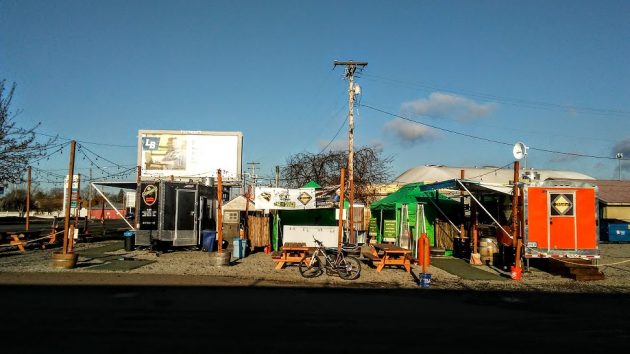
Food trucks on Pacific Boulevard near Queen Avenue on Dec. 1, 2020.
You call them food trucks. But the official designation seems to be “mobile food units.” And the city of Albany is fixing to regulate these units in a different way.
At a work session Monday, the city council went over a proposed food truck ordinance. The discussion made it plain that the draft law is not yet ready for council action.
According to Code Compliance Officer Kristopher Schendel, there are 18 food trucks in Albany, some arranged in pods and others sitting by themselves on vacant lots. Three more are expected to start up within a month.
Schendel’s memo to the council said the growth of this business has led to “multiple issues such as impacts to the visual landscape and previous land use approvals, violations of the development code, long wait times for permit processing, and a sense of unclear standards and requirements by many mobile food unit operators.” Another issue is the time city employees spend on food trucks.
The proposed law is intended to lessen those effects “while also allowing mobile food units to begin operating more quickly and efficiently.”

Leah Tucker of the Oregon Mobile Food Association talks to the Albany council Monday.
The council heard from a handful of food truck business owners and from Leah Tucker of the Oregon Mobile Food Association. The gist was that the council should consider their contributions to the economy and charitable causes, and not to discriminate against their businesses in order to shield traditional restaurants from competition.
Schendel’s draft would bar food trucks from having “amenities” such as tables, chairs, heaters or lighting, and outside storage units would not be allowed. The operators said they needed storage units for some of their supplies. One mentioned milk.
They also said outside lights were a matter of safety.
The mobile units could operate in Albany for two consecutive days without a permit. Beyond that, a city permit would be required, and it could be renewed annually for ever.
The draft law would require ADA-compliant restrooms on an “accessible route” within 300 feet of any food truck, but they could not be portable privies. I didn’t hear any discussion of that.
Without mentioning any particular provision, Councilwoman Matilda Novak said at one point she wanted it to be as easy as possible for food trucks to be in business in Albany.
Schendel said he would do more work on the draft. There was no word on when a food truck law would come before the council again.(hh)

Hopefully Albany takes advantage of how other city’s have dealt with food trucks.
The city council needs to read this report, “Food Truck Freedom, How to Build Better Food-Truck Laws in Your City.”
https://ij.org/wp-content/uploads/2015/03/foodtruckfreedom.pdf
The best laws follow two principles:
1. No Protectionism
2. Clear, Narrowly Tailored and Outcome-Based Laws
And always remember, it’s not government’s job to pick the winners and losers. In a free society that is the job of consumers.
No reason to disagree. I briefly thumbed through the report — looks very useful and is NOT just libertarian propaganda.
Food trucks (add) to the diversity of this city. I would like to note their charitable contributions as well. Tacos El Machin food truck did a fundraiser for the Albany Youth Symphony two years ago. It was a lifesaver for the organization.
What I don’t really like of how food trucks are operating lately is that they are becoming small fixed restaurants in disguise.
Honestly, I would love for these trucks to appear in different parts of the city, including residential and suburban, every day, and following them on social media to know where they are going to be the next day or if there is one coming to my neighborhood so I can go walking to get a nice sandwich. It would be like the excitement of hearing the ice cream truck but for adults!
“The draft law would require ADA-compliant restrooms on an “accessible route” within 300 feet of any food truck, but they could not be portable privies. …”
On first impression, seems this provision in the draft law will severely limit locations for this business type, making the food truck operation not easily viable.
If we are to have just laws, they must have the same effect, do you realize that a local Restaurant had to put an ADA bathroom up a flight of stairs before they could open??? What we need is one set of rules
So then, what you are suggesting is “mobile food units” will, for the most part, be regulated out of existence?
Hey Rich, what restaurant are you talking about?
The only one I could think of off the top of my head was Novak’s, and they proposed an elevator to reach the 2nd floor, which then required the bathrooms to be ADA accessible. Make sure you don’t only tell half of the story next time…..
It is Novaks and they did not want an elevator, when I pointed out how stupid demanding a wheelchair ready bathroom up a flight of stairs was, staff came back with “well someday they may want to put in an elevator.” Jasper, you should get your facts straight.
The one on Pacific is starting to look like a homeless encampment. Glad they’re finally going to tell them to cut that out.
When making rules for food trucks it is important to make sure that they have to comply with ALL the things that we make brick and Morter establishments comply with. For example if a brick and morter has to have a $30,000 grease trap to use, then also the food trucks. Insurance, employee food service permits, payroll loading demanded by the State… Certifications demanded by dept of health etc.. Food Trucks come in varieties just like restaurants. Some good and some “not so good” we need a system to investigate when the not so goods show up… The ones that ;have been around had both, some dumped grease on the ground and others are responsible… penalties for the first. Food orders for the second..
OMG…these are businesses that are giving us an alternative to dining with other than Fast Food Drive through… they are offering a healthier option with our MUCH restricted indoor dining.
Leave these poor entrepreneurs alone… the state has restricted them for our safety… I get that, but do not make it harder for them when their brick and mortars are shut down… outside ADA bathroom facilities??? Ridiculous! Are you going to do that to restaurants opening sidewalk/alley venues?? Not seeing that required so far!
These entrepreneurs are bringing a much need variety to our cities… they are following health/food service restrictions… leave them alone!
Rich Kellum has this thing right. I can’t believe I said that.
The Oregon Health Authority not that long ago spent a lot of effort overhauling mobile food unit regs. There was plenty of time for public input. Representatives of brick and mortar likely participated.
Cities have some role, but it’s not the city’s place to say who has what kind of grease trap. Linn County Health interprets the state regs and issues the mobile unit licenses.
Wrong Rebecca, grease traps keep the sewer system from clogging